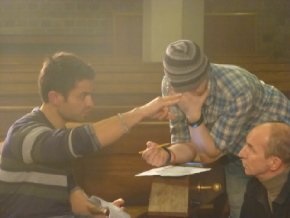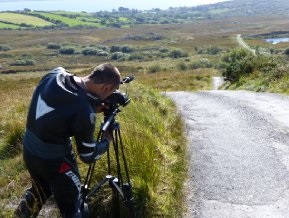The Portuguese already had their earthquake and somehow managed to survive and rebuild most of Lisbon since 1755. Although there was a little tremor during the week (about two-and-a-half on the Svetoslav Richter scale, or however it is called when measuring how much the earth moved for you), the otherwise sunny city of Setubal, one of Portugal's most important port-resorts and home of the poet Bocage,manages to mount the 27th edition of the international film festival Festroia surmounting many more difficulties than are usually weathered by such events.
Since the 3rd of June the event has unreeled with evident success... some strong selections of films in multiple sections, a lively selection of international guests, film-makers and sundry press, a sprinkling of cocktails and wine-tastings, and a growing number of enthusiastic film-fans of vastly varying ages at the screenings. All of this in a country that seems fast fado-ing towards euro-bankruptcy, and in a city where the main venue of the festival, the vast Forum Luisa Todi, a theatre-cum-cinema dating from the 1950s, is still under reconstruction(since 2008, and now unlikely to be ready to reopen its doors until the latter part of 2013).
Yet Portugal, it should not be forgotten, is one of the most cinephile countries in Europe, as - unlike Germany, Spain, Italy, France- it never dubbed films - Salazar, who had a villa that was a summer residence nestling in the leafy hills above Setubal, actually passed a law forbidding synchronisation in the cinema and the result is that even today on the many TV channels films are always shown in their original versions with subtitles, and every usherette, barman,and Portuguese festival director can at least understand- if not also capably speak- several European languages. The other gift for the film-maker here is the abundant and brilliant light, which rivals that of Greece, and ensures that filming can be conducted on most days of the year in many parts of the country.The local film industry, of course, is a different question- Portugal can be proud of having probably the oldest living film director in Manoel de Olivera, who is still making features at 101 or more, though it has yet to produce anyone like Almodovar to put lusomovies on the map, while the modest handful of stars of Portuguese origin are,frankly, only widely known because of their work in Paris or Hollywood.Indeed, one of the loveliest, Maria de Medeiros descended from Roissy, aptly enough on the national holiday here (June 10th) commemorating the death of Camoes and the Dia do Portugal, to host a characteristically civilised press conference - in her latest film, whose posters are everywhere evident on the Lisbon metro, she actually speaks Russian as her character hails from that rather different old empire.
Festroia is very much a family affair, as its Director Fernanda Silva fearlessly keeps it alight with a tight young team, and the supprt of friends around the festival circuit, while many of the staff seem to be related by blood or marriage.Though its main venue is still dark, she has again imported a huge screen and adequate sound and projection equipment into the Anunciada auditorium, which is in the hands of a religious order, and whose temporary transformation into a festival cinema soaks up a goodly portion of the overall budget. The building has been festooned with flags, film posters and even a red carpet greets the guests and audiences. On the brighter side, the historic municpal cinema Charlot has been renovated at a cost of over 200,000 euros since the 2010 festival and its comfortable new seats have been accommodating growing crowds during the 10 days' wonder that is this Festival.
The audiences deserve to be congratulated for their curiosity- the identity of Festroia, and what gives it its long-time FIAPF-approved status as a competition, is that its Official Section is restricted to features coming from countries that produce less than 30 films a year.....the First Worksp parallel section is open to all-comers,as is the largely shorts/documentary section entitled Man and his Environment, but there are a further 10 sections in the 11 day programme, and in spite of budget cuts, Festroia has managed to import no fewer than two dozen jury members,all comfortably lodged and adequately refreshed during their stay (and not only with the delicious local aperitif).In front of the main festival hotel, a futuristic couple of Kubrickian "Bubbles" have been constucted as guest centre and meeting point, where opening and closing cocktails were held, as well as nightly rendez-vous for fim-makers and film-lovers to discuss the meaning of Malick over Moscatel until four in the morning.
Phillip Bergson















